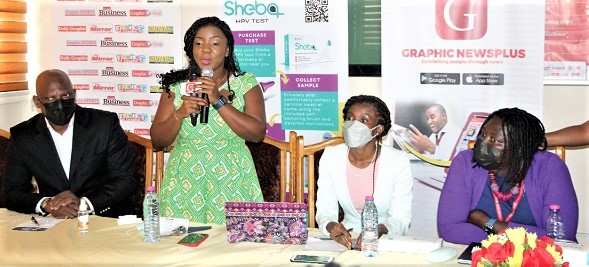
GCGL Local Union, The Mirror, celebrate women: Support cervical cancer self-test
A Specialist Obstetrician-Gynaecologist, Dr Nita Asamoa-Manu Gyimah, has stressed the need for women to get tested for cervical cancer, as the disease is the second cause of cancer mortality among women in Ghana.
She explained that one of the surest ways to detect and treat the disease was through screening, but noted that the country’s current screening rate was only 2.8 per cent.
She, therefore, said it was crucial for women to screen for the disease to allow early treatment and possible prevention.
“According to 2021 statistics from the Population and Housing Census (PHC), about 3,000 women are diagnosed with cervical cancer every year and out of the number, more than 1,000 die from the disease,” she said.
Dr Gyimah was speaking during a programme organised by the Women’s Commission of the Graphic Local Union and supported by The Mirror and Yemaachi Biotechnology to celebrate women and to mark the International Women’s Day on Tuesday, March 8, 2022.
Advertisement

It was on the theme: “Gender equality today for a sustainable tomorrow” with a tagline #breakthebias.
Symptoms
Dr Gyimah said the disease was caused by a Human Papilloma Virus, commonly known as the HPV virus, which affected the cells around the cervix, that is, the opening of the woman’s womb.
“As one gets older, the cervix undergoes many changes, and when the virus that causes the HPV affects the cervix, it then develops into cervical cancer,” she said.
She added that the country had about 9.4 million women between the ages of 15 and 44 years most affected by the disease.
She said “unusual bleeding in between one’s menstrual periods, unpleasant smell, pain in the pelvic and urinating often” were some of the symptoms of cervical cancer.
Awareness
Dr Gyimah also noted that some barriers to testing were the lack of awareness of the disease and the availability of facilities for screening.
She therefore called for more education on the disease.
“We must intensify awareness of the disease and how it spreads, talk to people about it and together we can get a lot of people to go get screened,” she said.
She urged everyone to get tested as it was more cost-effective than to spend millions of cedis to treat.
Introducing the Sheba HPV test kit at the event, the Head of Clinical Affairs at Yemaachi Biotechnology, Dr Emmanuella Amoako, urged women who found it uncomfortable to get tested in health institutions to get a self-test.
She said that the test kit reduced barriers to cervical cancer screening and helped with self-sampling HPV test.
The Managing Director of the GCGL, Mr Ato Afful, called on women in leadership positions to be deliberate in training subordinates and equipping them with skills.
He said female leaders ought to consciously train young females to make them confident.
Mr Afful asked women to consciously look after themselves and their health and also be purposeful in their conversations about their health.
“It is incumbent on leaders in positions to make sure that the team they are working with learn from them. When we have done that successfully it will reflect in our homes, the way we work and the way we treat other people,” he said.
Break biases
The Assistant Editor of The Mirror, Mrs Hadiza Nuhu-Billa Quansah, commended women at the GCGL for doing tremendously well in contributing to the growth of the company.
However, she said a UNFPA report on Gender, Social Index, which measured how social beliefs obstructed gender equality, disclosed huge gaps in the area.
She, therefore, urged women to be actively involved in breaking all biases against them.
The Women’s Representative of the GCGL Local Union of the Industrial and Commercial Workers Union (ICU), Amma Bruwah Apenteng, also encouraged her constituents to kick against all biases against them.
The Chairman of the Union, Mr William Ashaley, called on women to live beyond any biases impeding their progress.
